Secure and Verifiable
Online Voting
For Your Elections and Votes
Our end-to-end verifiable, secure, online election technology, proves the integrity of democratic processes and verifies the accuracy of voting results, without losing flexibility and ability for customization
Get a dedicated experienced election expert team to manage your event, or let us train you for self-service.
Protect democracy. Prove integrity.
Key benefits
Turnout And Accessibility
Proven track record of raising voter turnout up to 100%. Tap into our best practices and solutions.
Security And Verifiability
Advanced, verifiable, and mathematically proven solutions acknowledged by security focused customers and academia.
Service And Flexibility
Benefit from our 22 years of experience, best practices, and highly accessible and easy-to-use systems.
Solutions for All Online Voting Events
We offer our solutions as fully managed, self-service with initial training, or a hybrid of the two to suit your organization’s needs.
Supporting solutions
It is possible to add voter support systems and services, or candidate registration and presentation to your event
Assembly Pre Election
Assembly Pre Election is specifically designed to support your pre-election candidate nomination and presentation campaign as well as handle relevant interaction with voters. Read More.
The Future of Online Voting
Say Hello to Electa
World’s first combined end-to-end verifiable online voting system for Scheduled and Live Conference Voting
Assembly Voting is introducing the next-generation end-to-end verifiable online voting system to set a new high standard for election integrity in all types of democratic events.
Join us in embracing the new era of digital democracy with Electa!
e-book
How to Organize a Successful Online Voting Event
A step-by-step guide to setting up online voting in your organization
Regardless of how experienced (or inexperienced) you or your organization may be with online voting, our comprehensive guide got you covered. It is packed with valuable insights and best practices to help you navigate the world of online voting from A to Z.
In this ebook we will help you:
- Discover the benefits and principles of online voting.
- Acquire the knowledge to implement online voting in your organization.
- Discover essential features and configurations for online voting events.
- Gain insights into planning, timing, and budgeting for your voting projects.
- Access a helpful checklist for organizing a successful online voting event.
Regardless of how experienced (or inexperienced) you or your organization may be with online voting, our comprehensive guide got you covered. It is packed with valuable insights and best practices to help you navigate the world of online voting from A to Z.
In this ebook we will help you:
- Discover the benefits and principles of online voting.
- Acquire the knowledge to implement online voting in your organization.
- Discover essential features and configurations for online voting events.
- Gain insights into planning, timing, and budgeting for your voting projects.
- Access a helpful checklist for organizing a successful online voting event.
Main Features
Configure our system to support your specific election or voting needs, or contact us regarding any specific requirements.
Event types
-
Live Voting
-
Scheduled Voting
-
Candidacy Support
-
On-site or Online Support
-
Hybrid Voting
Secure and verifiable
-
End-to-end Verifiable
-
Threshold Encryption
-
Distributed Trust
-
Multi Factor Authentication
-
Receipt and Ballot Challenge
Ballot and Voting
-
Multiple Marking Options
-
Weighted Voting
-
Voter Groups
-
Quorum Rules
-
Multi Language Support
Compliance
Assembly Voting is fully compliant to EU GDPR legislation.
We conduct an annuall ISAE 3000 Type 2 revision and work accordingly to ISO 27001 standards.
Our hosting partner Exoscale’s hosting centers in Munich and Geneva is furthermore ISO/IEC 27001:2013, ISO/IEC 27017:2015 and ISO/IEC 27018:2019 compliant.
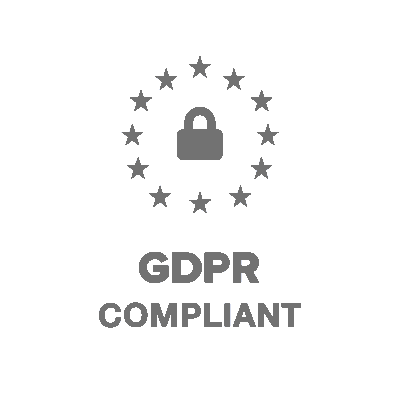





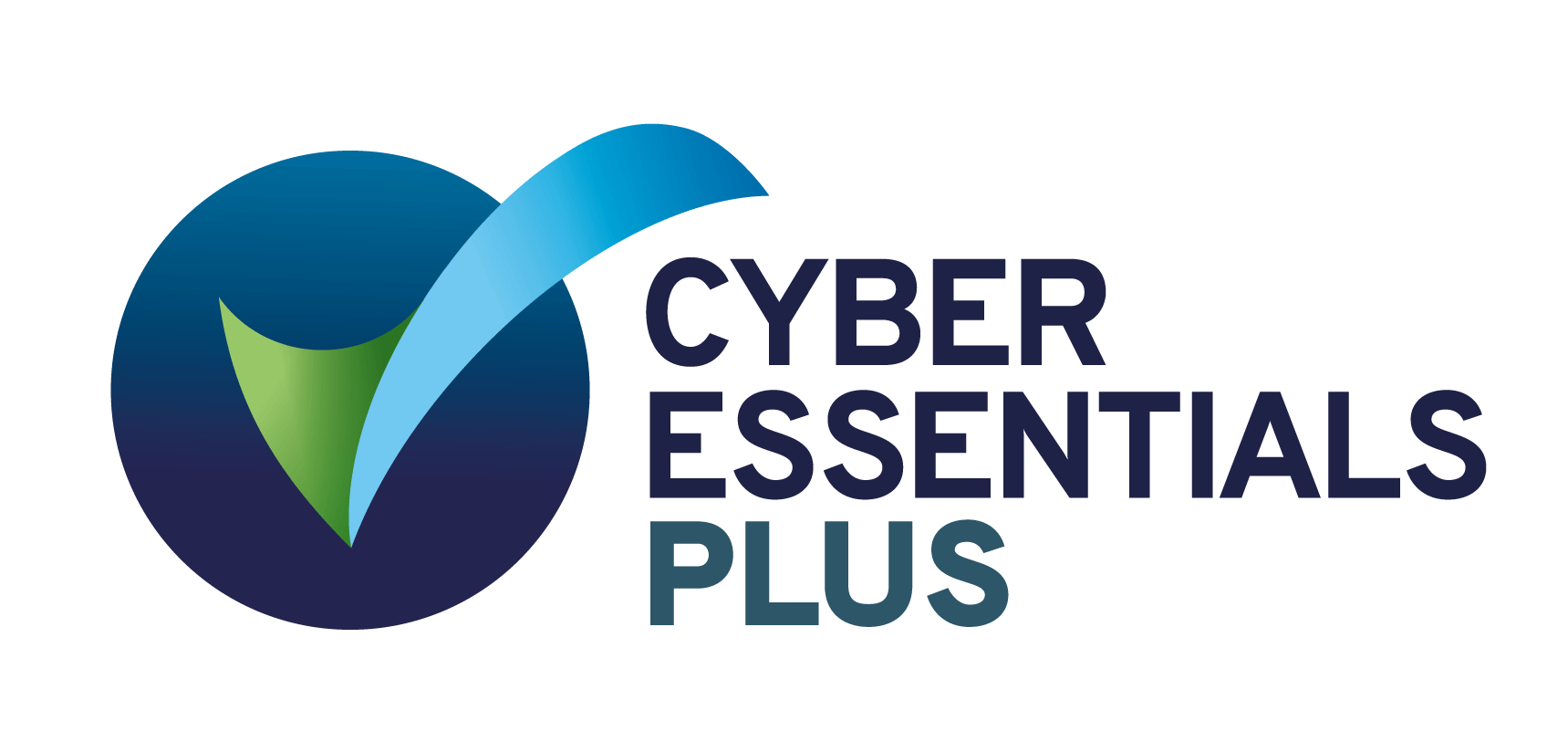

Over 20 Years of Experience
We are an independent Danish technology company, with over 20 years of experience in developing and providing election software, as well as conducting statutory and non-statutory elections.
Deeply rooted in scientific research, we deliver end-to-end verifiable election systems in which every single part of the voting process can be checked and verified.
We make our technology and expertise available for a wide range of democratic events and clients around the world. These include ministries, international organizations, political parties, trade unions, and NGOs.
Over 20 Years of Experience

We are an independent Danish technology company, with over 20 years of experience in developing and providing election software, as well as conducting statutory and non-statutory elections.
Deeply rooted in scientific research, we deliver end-to-end verifiable election systems in which every single part of the voting process can be checked and verified.
We make our technology and expertise available for a wide range of democratic events and clients around the world. These include ministries, international organizations, political parties, trade unions, and NGOs.
Over 20 Years of Experience

We are an independent Danish technology company, with over 20 years of experience in developing and providing election software, as well as conducting statutory and non-statutory elections.
Deeply rooted in scientific research, we deliver end-to-end verifiable election systems in which every single part of the voting process can be checked and verified.
We make our technology and expertise available for a wide range of democratic events and clients around the world. These include ministries, international organizations, political parties, trade unions, and NGOs.







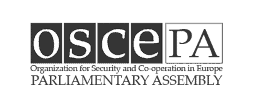


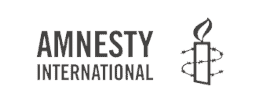

What is End-to-end Verifiability
and Why Should You Care?
The overall goal of a democratic election or vote is to provide an unambiguous result which can be acknowledged as such by the voters, the candidates, and other stakeholders. When using online voting, this can only be achieved through using an end-to-end verifiable election system.
End-to-end verifiability allows for the independent verification of an election’s accuracy, from vote casting to tallying, without placing trust solely in any one component or actor. This ensures secure and correct results while maintaining the anonymity of each vote. When choosing an online voting system, make sure it contains full end-to-end verifiability to prevent fraud and tampering from going undetected.
You should always avoid black box systems, as they lack integrity and leave the voting process vulnerable to fraud or accusations which cannot be disproven.
For a system to qualify as end-to-end verifiable, voters need to be able to confirm that their votes have been:
1. Cast as intended
2. Received as cast
3. Counted as received
End-to-end verifiable system
Blackbox system
-
End-to-end verifiable system
Refers to the process of verifying that the voter is eligible to cast a ballot in the election. It is a critical step in ensuring the security and integrity of the election process.
Ensuring eligibility in digital voting is important because it prevents fraudulent or unauthorized voting, such as when someone who is not registered to vote attempts to cast a ballot or someone tries to cast multiple votes under different identities.
By verifying eligibility, digital voting systems can ensure that only eligible voters are allowed to participate in the election, and that each voter is only able to cast one ballot.
In a digital voting system, “Distributed trust” is a concept that involves the distribution of responsibility across multiple components of the voting system.
This approach aims to provide a more secure and transparent voting system by avoiding the reliance on a single trusted authority. This means, components can fail or misbehave in a detectable way. If compromised, each component can then be fixed or replaced on its own.
In a distributed trust model, various parties involved in the voting process, such as the voter, the voting system, and third-party auditors, work together to ensure the accuracy and integrity of the election.
Each party has a specific role to play in providing checks and balances on each other, and this approach provides greater confidence in the accuracy and transparency of the election results.
Ultimately, distributed trust in digital voting with end-to-end encryption is important for ensuring the privacy and security of voters and the integrity of the election”, as there is no single entity that has too much power or knowledge.
Public Ballot Box” is a concept that refers to a public ledger that records all election events, including votes or configuration changes.
This approach is important for ensuring the transparency and integrity of the election process. The Public Ballot Box is a crucial component of the election system that enables end-to-end verifiability as all verification processes are done based on the data published on it.
In a digital voting system with a public ballot box, every voter’s vote is recorded and stored in a publicly accessible location, which allows for anyone to verify the election results. This approach provides greater confidence in the accuracy and fairness of the election.
Additionally, with votes being encrypted, the public ballot box can be maintained while preserving the anonymity of individual voters
Refers to the protection of voter privacy in the voting system.
Voter secrecy is designed into the system by utilizing cryptographic techniques to ensure that no one, not even the voting system itself, can read any particular votes before a result is computed.
The use of threshold encryption ensures that the integrity of the vote is protected while also preserving its secrecy. This is essential for ensuring the fairness and legitimacy of the election process.
In digital voting, “Anonymity – Proven By Design” is a concept that refers to the protection of voter anonymity in the voting system.
Anonymity is designed into the system by using cryptographic techniques that ensure that no one, including the voting system, can link a vote to an individual voter.
The use of mixing algorithms ensures that the connection between a vote and its voter is split across several entities, therefore, no single individual can determine what a voter voted for.
In digital voting, “Integrity of Election Result” is a concept that refers to the trustworthiness and accuracy of the election results.
Integrity is designed into the system by using carefully selected cryptographic techniques to ensure that the votes are securely and accurately recorded, transmitted, and counted. Moreover, providing public auditability, any independent entity can verify the integrity of a result.
The use of end-to-end verifiable election systems ensures that the election results are tamper-proof and cannot be altered without detection.
Therefore, the integrity of the election result is a fundamental feature of end-to-end verifiable digital voting systems, and it is essential for ensuring the fairness and legitimacy of the election process.
“Independent Audit – Fully Auditable” is a concept that refers to the ability to verify the accuracy and validity of the election results through an independent audit process, that is publicly accessible.
In an end-to-end verifiable digital voting system, the system is designed to be fully auditable, allowing independent auditors to review the cryptographic protocols and algorithms used in the voting process.
This approach provides a higher level of transparency and security than traditional paper-based voting systems.
Therefore, the independent audit process helps to ensure the fairness and legitimacy of the election process by providing a way to verify the accuracy and validity of all election events, including election cofiguration, voting, vote processing and result computation.
Overall, the use of end-to-end encryption and independent audit process provides a more secure and trustworthy method of digital voting.
-
Blackbox system
In a blackbox digital voting system, “Ensure Eligibility” refers to the process of verifying that only eligible voters can participate in the voting process.
Since a blackbox voting system is a closed system, there is no way to verify that the voters are who they claim to be or if they are eligible to vote.
Therefore, ensuring eligibility in a blackbox system requires the implementation of robust identity verification and authentication protocols.
This process typically involves verifying the identity of the voter through multiple factors, such as biometric identification, voter registration, and document verification.
The goal is to prevent fraudulent voting and ensure that only eligible voters can participate in the election.Overall, ensuring eligibility in a blackbox digital voting system is a critical step to maintain the integrity and legitimacy of the election process.
The absence of “Distributed Trust” in a blackbox digital voting system can lead to significant disadvantages and security concerns.
A blackbox digital voting system is a closed system that relies on the trustworthiness of its central authority, which can be susceptible to hacking, tampering, or corruption.
Without distributed trust, the central authority has full control over the system, which can undermine the transparency and security of the election process.
Additionally, a lack of distributed trust means that there is no way to independently verify the integrity of the voting process or audit the election results. This can erode public confidence in the legitimacy of the election results, leading to disputes and challenges that can undermine the stability of the democratic process.
The absence of a public ballot box in a blackbox digital voting system can create significant disadvantages and undermine the transparency and legitimacy of the election process.
A public ballot box provides a physical and visible record of the voting process that allows voters to verify that their votes are counted and that the results are accurate.
In contrast, a blackbox digital voting system lacks a physical record that voters can use to verify their votes or audit the election results. This can create a perception that the election results are susceptible to manipulation or tampering, eroding public confidence in the legitimacy of the election.
Additionally, the lack of a public ballot box can make it challenging to conduct independent audits or recounts, which can further undermine the transparency and fairness of the election process.
The absence of voter secrecy and an inability to prove it in a blackbox digital voting system can create significant disadvantages and undermine the privacy and integrity of the election process.
Voter secrecy is a fundamental principle of democratic elections, which allows voters to express their preferences without fear of reprisal or coercion.
However, in a blackbox digital voting system, it may be impossible to verify that voter secrecy is being maintained. Without a way to prove voter secrecy, voters may be hesitant to participate in the election or express their true preferences, which can undermine the legitimacy of the election results.
Additionally, the lack of proof of voter secrecy can make it difficult to detect and prevent coercion or vote-buying, which can further undermine the fairness and integrity of the election process.
Overall, the absence of voter secrecy and the inability to prove it can create significant challenges and undermine the legitimacy of a blackbox digital voting system.
The absence of voter anonymity and the inability to prove it in a blackbox digital voting system can have significant drawbacks, such as reducing voter confidence and compromising the privacy and legitimacy of the election.
The lack of anonymity may discourage voters from participating, thereby undermining the election’s credibility.
Moreover, the inability to verify voter anonymity can make detecting and preventing fraudulent activities more difficult, further eroding public trust in the election outcome.
Not ensuring anonymity in a blackbox digital voting system can severely harm the democratic process, making it essential to prioritize both anonymity and transparency in the system’s design and implementation. It is critical to address these issues to prevent potential risks and ensure the integrity of the election process.
The inability to prove the integrity of the election result in a blackbox digital voting system can be a significant disadvantage.
Without an assurance of accuracy and reliability, voters may lose trust in the election results and the democratic process as a whole.
Moreover, a lack of transparency in the election process may make it easier for malicious actors to manipulate the results, further compromising the integrity of the election.
Additionally, if the election result cannot be proven, it can be challenging to address any potential issues or discrepancies that arise during the election process.
Therefore, it is essential to implement measures that ensure the integrity of the election result can be verified and proven, such as end-to-end verifiability and independent audits. By doing so, we can increase transparency and public trust in the election process.
A blackbox digital voting system has limited auditability, which poses several disadvantages.
In a blackbox system, the voting process is not transparent, and there is no way to verify that the votes were accurately recorded, transmitted, and counted. This lack of transparency can lead to doubts about the integrity of the election and potentially erode public trust in the democratic process.
Moreover, in case of any errors or irregularities in the voting process, it is challenging to trace the cause and rectify it without an extensive audit trail.
Limited auditability also means that it may be challenging to detect and prevent any attempts at election fraud, making it easier for malicious actors to manipulate the election results.
In summary, limited auditability in a blackbox digital voting system can compromise the accuracy, integrity, and transparency of the election results.
customer stories
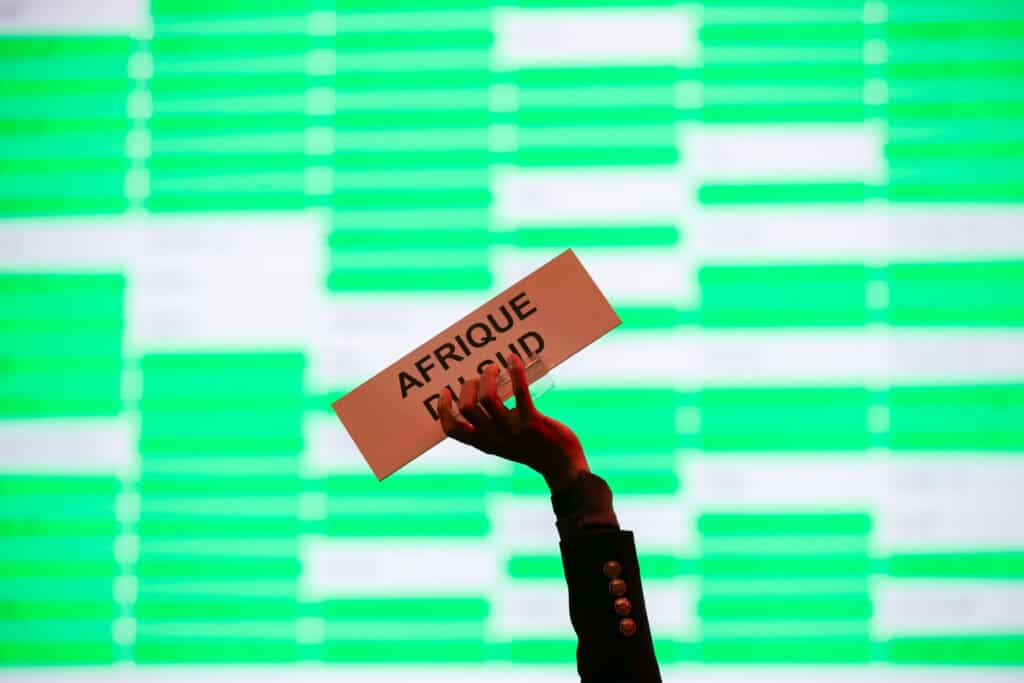
Assembly Voting Helps Global Humanitarian Organization Carry Out Multiple Voting Events in a Few Short Weeks
Read about how Assembly Voting helped an international humanitarian organization carry out a number of events within a short timeframe.

SD Worx and Assembly Voting: Better Together
As partners in online voting for nearly five years, Assembly Voting and SD Worx have forged a deep and mutually

Major Intergovernmental Organization Successfully Carries Out Its Largest-ever Voting Event With the Help of Assembly Voting
This year, Assembly Voting was fortunate enough to serve as the provider of online voting solutions for a major intergovernmental
Recent LinkedIn Updates
Free Webinar!
21st of May 2025
Ready to take a deeper dive into how end-to-end verifiable voting systems actually work in practice?
Don’t miss our next webinar next week on Wednesday, May 28th at 16:00 CET (10:00 EDT), where our Denmark CEO Jacob Gyldenkærne and Global Solutions Manager Víctor Hidalgo will take us through the “how” of secure online voting, including the construction of systems and mechanisms used to preserve the integrity of any online election.
The webinar is free of charge, so don’t pass up on the chance to sign up today using the link below!
https://lnkd.in/dJenqSzh
hashtag#onlinevoting hashtag#digitaldemocracy hashtag#webinar hashtag#endtoendverifiability hashtag#electa hashtag#lumiglobal hashtag#lumidenmark hashtag#assemblyvoting
The Ballot - Four Can’t-miss Insights from the 2025 Democracy Perceptions Index
30th of May 2025
We learned a lot at this year’s Copenhagen Democracy Summit – enough to fill several newsletters even.
As part of the event, the Alliance of Democracies Foundation released this year’s edition of their Democracy Perceptions Index, a comprehensive report which surveys citizens across numerous countries to understand how they view democracy in their own countries.
It made us think: how might we apply these findings to our mission of making fully verifiable online voting available to as many organizations as possible? We do just that in the May edition of The Ballot.
hashtag#theballot hashtag#onlinevoting hashtag#copenhagendemocracysummit hashtag#digitaldemocracy hashtag#lumiglobal hashtag#lumidenmark hashtag#assemblyvoting
The Ballot - Breaking Down Three Expert Concerns about End-to-End Verifiable Voting
30th of June 2025
We talk a lot about end-to-end verifiability, and we stand by our assessment that it is an essential property for any truly secure online election.
However, as revealed in a new study from the National Institute of Standards and Technology (NIST), some election experts are still cautious about recommending the wider adoption of end-to-end verifiable election technology.
In this edition of The Ballot, we explore three of the most common concerns expressed by these experts about end-to-end verifiability and offer our perspective in response.
hashtag#theballot hashtag#lumiglobal hashtag#lumidenmark hashtag#onlinevoting hashtag#digitaldemocracy hashtag#endtoendverifiability hashtag#e2ev
The Latest Blog Insights

Breaking Down Three Expert Concerns about End-to-End Verifiable Voting
Read along as we closely examine some expert concerns about end-to-end verifiability – and offer our perspective.
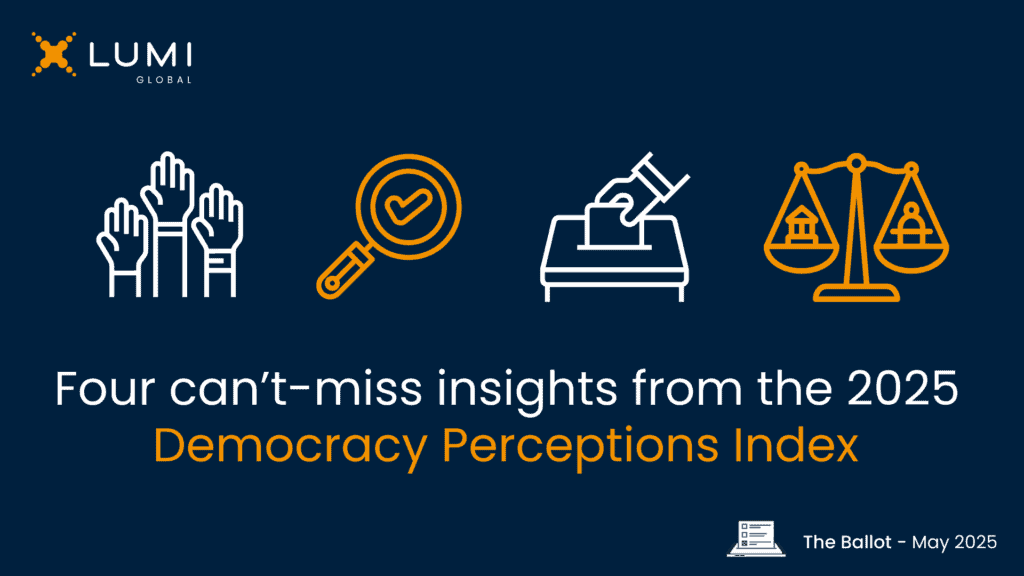
Four Can’t-miss Insights from the 2025 Democracy Perceptions Index
See what the 2025 Democracy Perceptions Index has to say – and what that means for us.
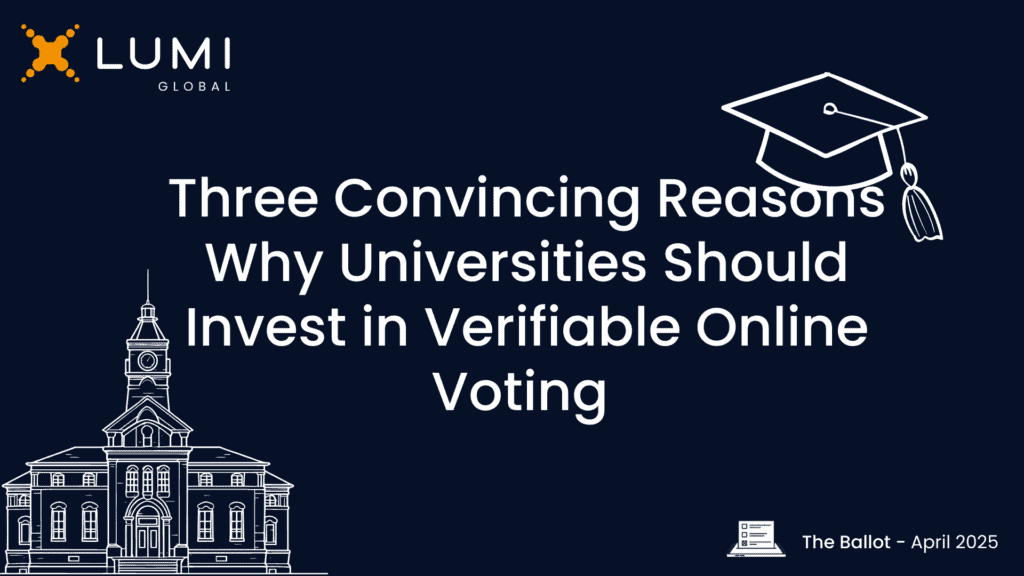
Three Convincing Reasons Why Universities Should Invest in Verifiable Online Voting
We present three compelling reasons why universities should put adopting online voting on the agenda.
protect democracy.
prove integrity.
At Assembly Voting, we believe that all elections are important. Whether they are large parliamentary or local, shareholder elections or elections for unions and associations, we have an online voting solution that fits.
Everyone deserves a voting result that can be proven beyond any doubt because doubt undermines the democratic mandate, the perceived integrity of the organization responsible for the election and overall trust in democracy.
We empower customers to prove the accuracy of election results with end-to-end verifiable technology that builds on scientific research and advanced cryptographic protocols.

protect democracy.
prove integrity.
At Assembly Voting, we believe that all elections are important. Whether they are large parliamentary or local, shareholder elections or elections for unions and associations, we have an online voting solution that fits.
Everyone deserves a voting result that can be proven beyond any doubt because doubt undermines the democratic mandate, the perceived integrity of the organization responsible for the election and overall trust in democracy.
We empower customers to prove the accuracy of election results with end-to-end verifiable technology that builds on scientific research and advanced cryptographic protocols.

Get in Touch
Frontpage Contact
"*" indicates required fields



